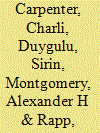| Srl | Item |
| 1 |
ID:
131511


|
|
|
|
|
| Publication |
2014.
|
| Summary/Abstract |
Through a series of focus groups with human security practitioners, we examined how powerful organizations at the center of advocacy networks select issues for attention. Participants emphasized five sets of factors: entrepreneur attributes, adopter attributes, the broader political context, issue attributes, and intranetwork relations. However, the last two were much more consistently invoked by practitioners in their evaluations of specific candidate issues. Scholars of global agenda setting should pay particular attention to how intranetwork relations structure gatekeeper preferences within transnational advocacy spaces because these help constitute perceptions of issues' and actors' attributes in networks.
|
|
|
|
|
|
|
|
|
|
|
|
|
|
|
|
| 2 |
ID:
102540


|
|
|
|
|
| Publication |
2011.
|
| Summary/Abstract |
While a number of significant campaigns since the early 1990s have resulted in bans of particular weapons, at least as many equivalent systems have gone unscrutinized and uncondemned by transnational campaigners. How can this variation be explained? Focusing on the issue area of arms control advocacy, this article argues that an important influence on the advocacy agenda within transnational networks is the decision-making process not of norm entrepreneurs nor of states but of highly connected organizations within a given network. The argument is illustrated through a comparison between existing norms against landmines and blinding laser weapons, and the absence of serious current consideration of such norms against depleted uranium and autonomous weapons. Thus, the process of organizational issue selection within nongovernmental organizations (NGOs) and international organizations (IOs) most central to particular advocacy networks, rather than the existence of transnational networks around an issue per se, should be a closer focus of attention for scholars interested in norm creation in world politics.
|
|
|
|
|
|
|
|
|
|
|
|
|
|
|
|